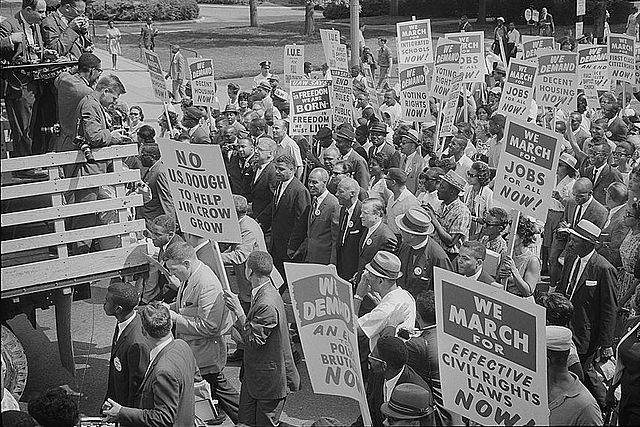
I didn’t expect the NFL, better known for protecting violent criminals and covering up brain damage, to become a nexus of civil rights activism. But as the anthem protests begun by Colin Kaepernick sweep the league (CN: autoplay video), it’s hard not to see an unfolding social-justice consciousness.
Predictably, the protests have come with a backlash. Many fans are angry at Kaepernick’s decision to kneel during the national anthem, even though he decided to kneel rather than sit on the advice of a veteran, and have booed other player demonstrations. Our white supremacist president profanely demanded the firing of any NFL player who protests in any way. Polls suggest this kind of protest isn’t viewed favorably by the public:
In one poll, which was conducted by Reuters, 72 percent of Americans said that they thought Kaepernick’s behavior was unpatriotic. Another 61 percent said that they do not “support the stance Colin Kaepernick is taking and his decision not to stand during the national anthem.”
These numbers may sound dispiriting. However, I deny that public disapproval is a reason for the NFL players to stop what they’re doing. Much the contrary, I think it forms a historical analogy that ought to boost their confidence that they’re on the right side.
As Elahe Izadi wrote for the Washington Post last year in reference to the Black Lives Matter movement (which draws similar disapproval in public opinion polls), every civil-rights movement was scorned and reviled by the public of its time, even the ones that we now mythologize and remember as heroic.
Today, sit-ins, freedom rides and marches for voting rights are viewed with historical reverence. Schoolchildren across the country memorize Martin Luther King Jr.’s “I Have a Dream” speech. Conservatives invoke the moral authority of the civil rights movement as a model for their own activism. Civil rights workers are viewed as national heroes.
But in their day, activists were met with widespread disapproval…
Because we now approve of what the civil rights movement was trying to achieve, we tend to project that memory into the past and assume they were greeted with applause in their own day. Nothing could be further from the truth. Just like today’s protesters, Martin Luther King Jr. and other civil-rights activists were scorned as troublemakers who were threatening the fabric of society and trying to disrupt a social order that was working perfectly well:
In 1961, mobs in Southern cities attacked Freedom Riders, the activists testing the federal ban on bus segregation. Most Americans weren’t on the activists’ side; 61 percent said they disapproved “of what the ‘Freedom Riders’ are doing,” according to a 1961 Gallup Poll.
That same poll found that 57 percent of Americans felt the “Freedom buses,” sit-ins at lunch counters and “other demonstrations” by African Americans would hurt their chances of being integrated in the South. Just 28 percent of Americans said these actions would help.
Even the March on Washington, where King delivered his immortal I Have a Dream speech, was viewed as threatening:
Just before the 1963 march, Gallup asked a nationally representative sample of adults how they felt about the coming event. Less than a quarter of Americans said they held favorable opinions.
…The divide was even starker when whites were asked about demonstrations overall; 85 percent of whites in a 1966 Harris survey said such protests actions by blacks would hurt the advancement of civil rights.
From our modern vantage point, it’s strange how this has happened. King and his movement not only triumphed in spite of widespread disapproval, they overcame it so completely that most people have forgotten they were ever controversial. This is similar to what I call “the march of progress”, where religious conservatives fight as hard as they can to stop social reform, and when it comes to pass in spite of them and becomes part of society’s evolving moral consensus, they turn around and claim credit for the outcome they fought to prevent. White America’s historical amnesia about racism is an example of this in a secular context.
It’s also a case study in how the Overton window moves. Almost by definition, protests calling for social change will be unpopular at first. The majority will never welcome criticism by a minority condemning that majority’s actions as unjust. Apologists for the status quo will always come up with excuses for why this is the wrong time, or the wrong method of protest, or the wrong people to raise the banner of change. No matter what you do, they’ll always tell you to do something else if you want to win the public over. (Kaepernick’s choice to kneel rather than sit for the anthem is a case in point.) Or else they’ll pretend bewilderment as to what the protesters want and act as if there’s no way to satisfy them, even when they make their demands perfectly clear (as the NFL players have).
There’s no winning this shell game. Taken as a whole, the criticisms of civil-rights protesters aren’t a call for different tactics, but a demand for stasis. The only thing to do is push on in spite of them.
This accords with what I’ve written about firebrand atheism. Whether it’s race, religion or patriotism, the principle is the same. Any protest that challenges a widely held belief, especially a belief that’s seen as a totem of tribal membership, will draw angry, knee-jerk rejection no matter how conciliatory you try to be. But if you persist in spite of that reaction, a demand that initially seems outrageous will come to seem familiar, and eventually, inevitable. Rewriting history to make it seem as if no one was ever against it is just the last and strangest step.
Image credit: The March on Washington for Jobs and Freedom, via Library of Congress